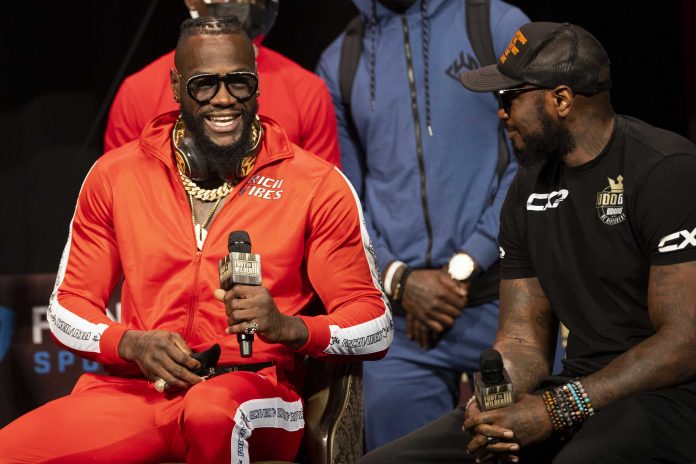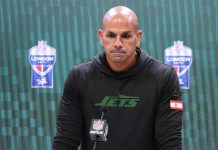
By GREG BEACHAM
AP Sports Writer
World champion boxers have reacted to their first career losses in all sorts of dramatic ways while they scramble to cope after their mental armor of invincibility is punctured.
Some fire their longtime trainers. Others make unbelievable, outlandish excuses. Nearly all insist the defeat was an unfair, undeserved setback that will be set right immediately.
Deontay Wilder did all three in the days, weeks and months after Tyson Fury badly beat him in February 2020.
The former WBC heavyweight champion clearly struggled to process his first loss since the 2008 Beijing Olympics, and he responded by upending his career and his reputation in a quest to make it better. Wilder (42-1-1, 41 KOs) also exercised the rematch clause in his contract, forcing Fury back into the Las Vegas ring with him Saturday night for the long-delayed completion of an already memorable trilogy.
“You’re looking at a rejuvenated and reinvented Deontay Wilder,” he said recently. “The old Deontay is no longer there. I can’t explain it to you, I have to show you.”
The man who helped transform Wilder from an aspiring basketball player to a late-blooming boxer and an eventual heavyweight champ is no longer there, either: Wilder fired trainer Mark Breland, who threw in the towel when his fighter was getting shellacked by Fury.
Wilder blamed his performance on a litany of fantastical factors — Breland spiking his water bottle with a muscle relaxant, Fury using illegal gloves, and even leg fatigue from supporting the elaborate costume he wore on his ring walk. He also accused referee Kenny Bayless, a teetotaler, of being drunk.
It all seemed ridiculous to everyone except Wilder and his most devoted fans, but coping with losses is a difficult part of any boxer’s job. What’s more important is whether Wilder figured out a way to improve from the fighter who seemed tactically outmatched and physically incapable of overcoming it for most rounds of his first two fights with Fury (30-0-1, 21 KOs), the confident British champion.
“I’ve dedicated myself and devoted my time and my body, me and my team, to reinventing myself,” Wilder said Wednesday. “I’m ready to reintroduce myself to the world. … This fight is about redemption, retaliation and retribution.”
Wilder replaced Breland with Malik Scott, a former heavyweight who got knocked out by Wilder in 2014. Scott has rededicated Wilder to fundamentals of movement and punching, with the belief Wilder can overcome Fury’s technical precision with a practical application of his fighter’s physical strengths.
But every fight for Wilder is in the head, and it’s still unclear what kind of shape he’s in mentally after his wild excuse-making binge in 2020. On Wednesday, Wilder said he still believes everything he claimed about the loss, and he called Breland “a disloyal trainer.”
“My energy is like my mind,” Wilder said. “It’s very violent.”
After Wilder’s rematch clause and an arbitrator’s ruling forced Fury to drop out of a planned summer matchup with fellow British champion Anthony Joshua, the trilogy bout was delayed from July to October by a COVID-19 outbreak in Fury’s camp. Those three months of training could prove important for Wilder, who has taken a more mature perspective on the loss in recent interviews.
“I needed everything that happened in that (second) fight,” Wilder said. “It was really a blessing in disguise.”
Although he is coming off months of dedicated training, Wilder is still a wild card — which fits this matchup just fine, since Fury isn’t exactly a conventional human being himself.
While promoting the fight earlier this summer, Wilder basically refused to speak at his own news conference — and then engaged in a six-minute staredown with Fury during the ceremonial faceoff.
And in their final news conference Wednesday, promoters wouldn’t allow Wilder and Fury to face off for fear of a brawl breaking out.
“Saturday night is going to be a different fight,” Wilder said. “It’s rare that we get trilogies like this, and I truly believe this one is going down in history.”



















